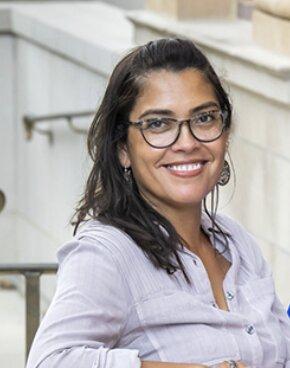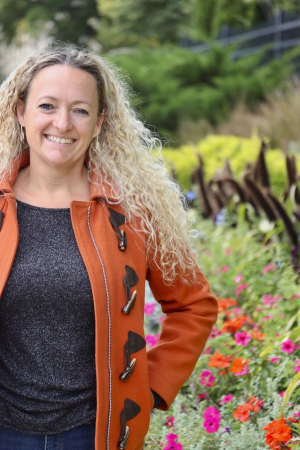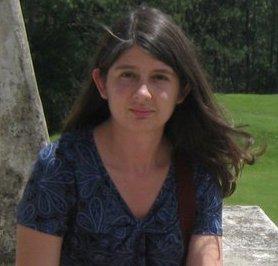Building an Indigenous Language Hub in the Midwest
Resituating research on linguistic access, justice, and reclamation

When talking about language justice, Korinta Maldonado, an assistant clinical professor in the Department of Anthropology at the University of Illinois Urbana-Champaign, focuses on the beauty of the language first. This is a practice she learned working alongside community members in central Illinois who are speakers of Indigenous Mayan languages—and one that she calls upon as a member of “Maya in the Global Midwest,” a multi-institutional and organizational collective creating accessible research pathways for language justice activism in the Midwest.
Funded by the Humanities Without Walls’ Grand Research Challenge initiative, Maya in the Global Midwest is an interdisciplinary collaboration between scholars and community members at the University of Wisconsin-Madison, the University of Illinois Urbana-Champaign, Eastern Michigan University, four local community organizations based in Ohio—Amigas, Puentes, Comunidad Sol and the Immigrant Worker Project—and two local community organizations based in Illinois: Pixan Kono’b Maya Q’anjob’al Language Justice Collective, and the New American Welcome Center.
This evolving partnership requires co-PIs Laura Horton, (assistant professor in language sciences at the University of Wisconsin-Madison), María Luz García, (associate professor of anthropology at Eastern Michigan University), and Maldonado to re-situate and reconstitute what it means to engage with communities, to think about the pace and infrastructure of research, and to collaborate using the HWW research methodologies of reciprocity and redistribution.
“New communities of speakers of Indigenous Mayan languages exist across the Midwest region, but there is little documentation of their experiences in English-dominant public and institutional spaces,” Horton and García said.
“We are a team of local community organizations, residents, and academic professionals working to support ongoing initiatives to raise awareness of language access barriers, and strategies for navigating them.”
A Shared Priority of Language Access
Community concerns, experiences, and strengths around issues of language access and language justice drive the project. The collective has developed a series of workshops, a community-designed survey and community-driven interviews using ethnographic methods that focus on the experiences of Indigenous Maya communities living in the U.S., with a particular emphasis on linguistic access to institutions including hospitals, schools, and legal employment services.
Within the first year of the project, one of the principal activities was a series of workshops. The first workshop held in Ohio provided an opportunity for members of the Ohio-based communities and Illinois-based communities to meet in person. Other workshops, hosted both in-person and on Zoom, covered a variety of topics, including what it means to do research, articulating and refining research questions, and identifying research objectives. Two ethnographic workshops were held in partnership with the community organization Puentes—with the goal of finding ways to make ethnographic research more collaborative.

Most recently, the Maya coordinators have requested adding an additional workshop for García to present her research on Maya participation in Guatemala’s legal systems. This workshop will be designed to inform the work of local Maya legal interpreters in the U.S., who are participants in the overall project. In practicing reciprocal research methodologies, the co-PIs have realized that there is a “shared priority of language access and interpreting practices in legal contexts.”
“Grand Research Challenge funding has created opportunities for Maya community members to be active participants and leaders in research,” said Horton and García. “Many of these members of our research team would not have had the option to devote significant time to work on these topics otherwise, despite their commitment.”
Supplemental funding has also allowed Q’anjob’al community leaders in Illinois to have more regular and consistent participation in the overall project. The supplemental funds also make transcription and translation possible for each of the Mayan languages spoken by participants.
Carving Out Space for Multi-lingual Voices
This research does not exist in a vacuum. Horton, García and Maldonado recognize that their community-based, language reclamation work takes place in a colonial, monolingual-dominant society. They, alongside the speakers of Indigenous Mayan languages, persist against all odds.

Coordinating six community organizations across two field sites within the structures of three different academic institutions has proven to be rife with administrative challenges: more than a year into the project, many of the participants have not been reimbursed for their time and contributions. Project delays have forced some participants to withdraw, and as a result, the scope of the project has continued to change.
“Having the capacity to engage directly in Mayan languages is crucial to the aims of this project. Administrative difficulties have also made us realize how essential funding is, especially when including community members who rely on regular sources of income and for whom significant delays represent a real hardship,” Horton and García said. “It has become clear how important the strength of previous relationships among research participants and community members has been in the project’s continued success.”
A significant portion of Horton, García, and Maldonado’s labor for Maya in the Global Midwest goes toward creating necessary infrastructure within complex organizational systems and hierarchical institutional settings. These systems were not built to support and provide open spaces for community members that may not speak English, only speak Spanish, do not have access to technology, or may not be able to read or write in the English language. The Maya in the Global Midwest project team are carving out space for community members to have access to resources and have multilingual voice(s)heard.
“We have become increasingly aware of the structural barriers to redistribution and reciprocity and the invisible and largely uncompensated labor involved in engaging those structural barriers,” Horton and García said. “We have experienced first-hand the ways that community members themselves cannot access resources and must rely on our own intervention in otherwise opaque institutional structures. The process has made the structural differences in our positions salient and has brought into focus the ways that all of us rely on personal relationships to be able to navigate barriers to access.”
Creating a Network of Knowledge Producers
The relationships between the co-PIs, members of local community organizations, and the community members themselves are not one-sided. Maldonado emphasized the importance of building community slowly, thinking through methodological processes, building trust when navigating bureaucratic paperwork, and coming to a shared understanding of how to create a “common grammar of what research means.”
“We are departing from such different worlds and world views and languages that we have to constantly be revising and making sure that we are coming to a common ground,” Maldonado said. “We each take our own role in generating knowledge. Community members are doing their own work, and we're doing our own work, then we think about [our shared understandings].”
It takes time to consider what meaningful, collaborative research looks like, and it also takes time to see how community-based research can evolve. The number of individuals participating in the Maya in the Global Midwest project numbers in the dozens, and the project has created a “network of knowledge producers” who are in turn posting Tik Toks and other relevant resources for community members that want to talk, write, and read in distinct Indigenous Mayan languages.
“Our project has been a process of continually redefining and reimagining our methods and objectives in productive ways as we work with two teams, each with diverse sets of stakeholders,” Horton and García said. “We have spent much of the first year of the project working together to develop methods that will facilitate engagement and enable collaboration across various agendas and aims. By listening to the needs of the community, we have been able to expand the scope of the project and organize our team to match the aims of the community representatives.”
Centering Community Needs
One change included listening to community partners in Ohio when they expressed their desire to expand representation of the community to include all the Mayan languages spoken in the area. Horton, García, and Maldonado restructured a position on the research team to facilitate participation from three project coordinators who work with eight community leaders representing five language communities and speakers of two distinct varieties of the K’iche’ language.
A new project partner, Comunidad Sol, was added to the project in March 2024. At the onset of Maya in the Global Midwest, there was not an organized body of Maya community leaders based in Ohio with an orientation that matched the project’s focus. Many individual community leaders were included in the project’s initial application, but over time, several of the Maya community members involved in the work expressed interest in being represented collectively in the research process. Comunidad Sol, an organization that represents the energy present in the Ohio Maya community, provides Maya living in the region with an organizational support through which to understand and advocate for changes within the institutional structures that affect Maya community members.
In the next year, the Maya in the Global Midwest project team will be administering a survey that was developed through community workshops at both field sites, conducting extended follow-up interviews, and engaging in ongoing ethnographic work. Procedures for ethical data collection, management, and storage will be established to support these activities. The team has also established a practice of recording meetings to make academic contributions—including joint authorship of reports and public workshops—more accessible for all members of the team.
There will also be a pair of workshops hosted by Dr. B’alam Mateo Toledo, a Q’anjob’al linguist, and María Andrea Mendoza Simon, program coordinator of the Academia de Lenguas Mayas de Guatemala (Academy of Mayan Languages of Guatemala, ALMG) and Awakateko interpreter. These workshops are designed to equip speakers of Mayan languages with confidence and resources to use as interpreters and community leaders.
Through various iterations and adaptations, Horton, García, and Maldonado have held steadfast to centering community needs. Community members get to decide how these language skills are used. They are not passive participants in the process of decolonizing language learning, access, and reclamation. Research data becomes a shared resource; the validity of a data point is decided upon by the collective. It reframes the essential question: who is this knowledge for—and why?
“An important thing we are incorporating into workshops on research ethics, IRB, and data sovereignty in Indigenous research protocols,” Maldonado affirmed. “We want to reflect different ethical knowledge-making beyond the Western-informed gaze.”
Resources
Current Grand Research Challenge projects
Professor Horton Receives Humanities Without Walls grant
Illinois language justice collective helping to preserve Indigenous Mayan languages
Published on April 26, 2024